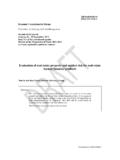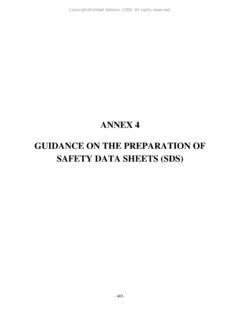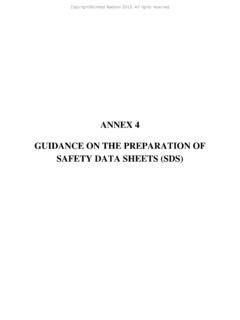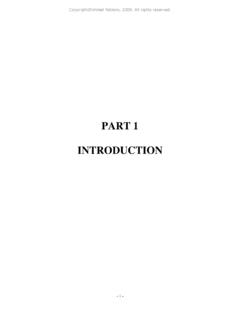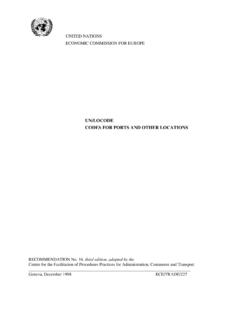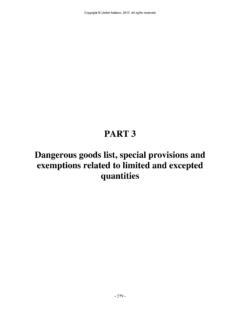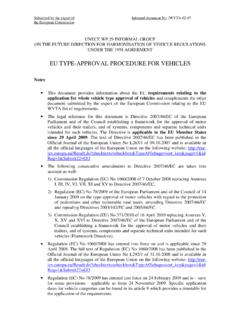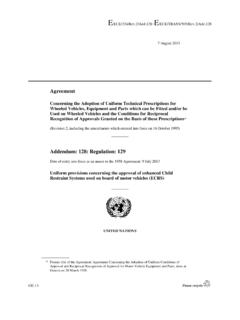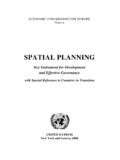Transcription of ENVIRONMENTAL PERFORMANCE REVIEWS …
1 ECONOMIC COMMISSION FOR EUROPE Committee on ENVIRONMENTAL Policy ENVIRONMENTAL PERFORMANCE REVIEWS kazakhstan UNITED NATIONS New York and Geneva, 2000 ENVIRONMENTAL PERFORMANCE REVIEWS Series No. 8 NOTE Symbols of United Nations documents are composed of capital letters combined with figures. Mention of such a symbol indicates a reference to a United Nations document. The designations employed and the presentation of the material in this publication do not imply the expression of any opinion whatsoever on the part of the Secretariat of the United Nations concerning the legal status of any country, territory, city of area, or of its authorities, or concerning the delimitation of its frontiers or boundaries.
2 UNITED NATIONS PUBLICATION Sales No. ISBN 92-1-116770-1 ISSN 1020-4563 iii Preface The EPR project in kazakhstan had originally started in September 1997, but had to be interrupted for organizational reasons. A second preparatory mission therefore had to be organized and took place in October 2000. It resulted in a new structure for the report, which was adapted to the many changes in the country that had occurred in the meantime. The review team for the project was constituted following these decisions and included national experts from Finland, France, Denmark, Germany, Romania, Slovakia, Slovenia, Spain and Uzbekistan, together with the ECE secretariat, UNEP and the Bilthoven Division of the WHO European Centre for Environment and Health.
3 The costs of the participation of experts from countries in transition, as well as the travel expenses of the ECE secretariat, were covered by extrabudgetary funds that had been made available from Finland, Germany and Italy. In addition, the Netherlands contributed funds to the Kazakh expenditures for the organization of the project, in a bilateral project. All contributions were essential to the implementation of the project. The review mission to kazakhstan was undertaken in May 2000. The draft of the EPR report was finalized subsequently and was submitted to Peer review by the ECE Committee on ENVIRONMENTAL Policy at its annual session in Geneva on 26 September 2000.
4 The Peer review was prepared by the EPR Expert Group, which discussed the draft report and its recommendations with a high-level delegation from kazakhstan . The discussion resulted in proposed modifications of the EPR recommendations, which were forwarded to the Committee, which finally approved the recommendations as they are set out in this report at the end of its deliberations. The review of kazakhstan s ENVIRONMENTAL PERFORMANCE in many ways concentrated on the difficulties of national ENVIRONMENTAL management in a country of a considerable surface but low population density.
5 The intensity of many problems of ENVIRONMENTAL degradation add to the problems. The adopted recommendations therefore often focus on questions of how to cope with strong regional differences in ENVIRONMENTAL conditions as well as with the most complex threats to human health and nature. In general, the report conveys the need for well-coordinated and decisive action in many areas, if the requirements for an improved and sustainable socio-economic development are to be met. The ECE Committee on ENVIRONMENTAL Policy and the ECE review team wish the Kazakh Government success in their important future tasks, including the implementation of the recommendations contained in the present report ivLIST OF TEAM MEMBERS Mr.
6 Andreas KAHNERT (ECE secretariat) Team Leader Mr. Ivan NARKEVITCH (ECE secretariat) Project Coordinator Ms. Mijke HERTOGHS (ECE secretariat) Features of kazakhstan Ms. Anita Pirc VELKAVRH (SLOVENIA) Chapter 1 Ms. Marjukka HILTUNEN (FINLAND) Chapter 2 Ms. Sabine HOEFNAGEL (UNEP) Chapter 3 Ms. Katarina MAGULOVA (SLOVAKIA) Chapter 4 Mr. Ivan NARKEVITCH (ECE secretariat) Chapter 5 Mr. Claus BUNNENBERG (GERMANY) Chapter 6 Ms. Liliana MARA (ROMANIA) Chapter 7 Ms. Catherine MASSON (ECE secretariat) Chapter 8 Mr. Rene NIJENHUIS (ECE secretariat) Chapter 8 Ms. Karin REQUIA (ECE secretariat) Chapter 9 Ms. Eugenia LANOVENKO (UZBEKISTAN) Chapter 10 Mr. Morten Guld NIELSEN (DENMARK) Chapter 11 Mr.
7 Miguel Angel CASERMEIRO-MARTINEZ (SPAIN) Chapter 12 Mr. Yannick GUERRINI (ECE secretariat) Chapter 13 Mr. VAN DE WEERDT (WHO/ECEH) Chapter 14 The designations employed and the presentation of the material in this publication do not imply the expression of any opinion whatsoever on the part of the Secretariat of the United Nations concerning the legal status of any country, territory, city or area or of its authorities, or concerning the delimitation of its frontiers or boundaries. In particular, the boundaries shown on the maps do not imply official endorsement or acceptance by the United Nations.
8 VTABLE OF CONTENTS FEATURES OF kazakhstan .. 1 6 Physical and social conditions .. 1 Economic policy and development .. PART I: THE FRAMEWORK FOR ENVIRONMENTAL POLICY AND MANAGEMENT Chapter 1: Legal instruments and institutional arrangements for ENVIRONMENTAL 9 - 20 The legal framework .. 9 ENVIRONMENTAL policies and institutional arrangements .. 12 ENVIRONMENTAL monitoring and 15 Public participation and NGOs .. 16 ENVIRONMENTAL education .. 17 Conclusions and 18 Chapter 2: Regulatory and economic 21 - 34 Regulatory and planning instruments.
9 21 Economic 25 ENVIRONMENTAL financing and 28 Conclusions and 32 Chapter 3: International 35 - 48 General objectives for international cooperation .. 35 Regional cooperation in the framework of UNECE .. 36 Bilateral cooperation .. 37 Regional cooperation .. 37 Global 40 International 42 Conclusions and 45 PART II: MANAGEMENT OF POLLUTION AND OF NATURAL RESOURCES Chapter 4: Air management .. 51 - 66 State and determinants of air pollution .. 51 Policy objectives and management practices.
10 58 Conclusions and 63 Chapter 5: Municipal and industrial waste management in the Eastern 67 - 76 General characteristics of waste flows .. 67 Treatment, use and disposal of industrial wastes .. 70 Municipal waste recycling and disposal .. 70 Main ENVIRONMENTAL risks associated with waste .. 72 Waste policy and management .. 73 Conclusions and 75 vi Chapter 6: Management of radioactively contaminated territories .. 77 - 96 The radiation situation in 77 Legal framework for the management of radioactively contaminated sites .. 89 Programmes and projects for the clean-up of radioactive contamination.
